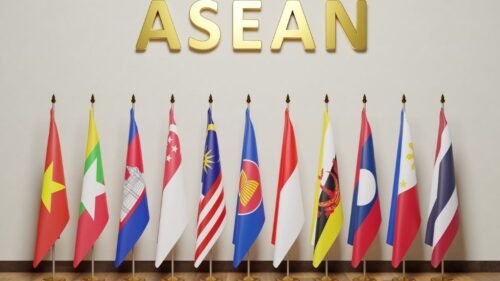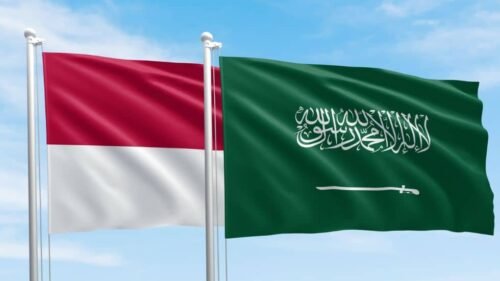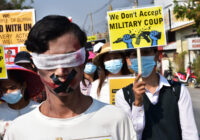Indonesia’s archipelagic geography and cultural-economic diversity offer both protection and resilience in the face of global instability. However, in today’s fast-evolving world, Indonesia occupies an uncertain position. Indonesia’s safety and security is not always guaranteed with the rise of major global conflicts. Its natural resources and sovereignty must be actively maintained through a foreign policy of neutrality and non-alignment. Only then can Indonesia’s resource base and the strategic advantages of its archipelagic geography be protected.
At the same time, a neutral foreign policy presents challenges. Evolving global circumstances, such as new alliances, require Indonesia to adapt its policies while simultaneously maintaining its national identity. Questions have been raised about whether Indonesia’s neutral foreign policy stance is able to safeguard its sovereignty amid shifting geopolitical dynamics.
A foreign policy based on justice and independence
Since its independence on August 17, 1945, Indonesia has pursued a “free and active” foreign policy. This policy promotes neutrality and non-alignment with any power bloc while actively promoting global peace and the abolition of colonialism. First espoused in 1955 by President Soekarno at the Asia-Africa Conference in Bandung, this principle became the foundation of Indonesia’s role in the Non-Aligned Movement. Indonesia continues to adhere to these policy principles as it navigates contemporary geopolitical dynamics.
Indonesia’s current president, Prabowo Subianto, a former army general, has reaffirmed the country’s commitment to non-alignment and peace. Many describe his approach as “free” — that is, neutral and non-aligned — but “more active.”
Within this context, his administration has prioritized strengthening defense capabilities through the modernization of equipment, facilities and infrastructure. He emphasizes that a robust national defense is vital to safeguarding sovereignty and ensuring long-term stability and prosperity. However, as Prabowo pushes Indonesia towards the global stage, questions about the effectiveness of a “free and active” foreign policy arise.
Indonesia’s foreign policy is often ambiguous
One of Indonesia’s most pressing foreign policy challenges lies in the South China Sea, particularly around the Natuna Islands. These waters, rich in natural resources, fall within Indonesia’s Exclusive Economic Zone (EEZ). However, some of this territory overlaps China’s “nine-dash line,” an area claimed by Beijing but lacking in definite coordinates.
Chinese fishing vessels and Coast Guard ships have repeatedly entered the area without consent, with many vessels engaging in illegal fishing activities. Such incursions not only violate international maritime law under the United Nations Convention on the Law of the Sea (UNCLOS) but also undermine Indonesia’s ability to safeguard its territorial integrity and national sovereignty.
In 2024, China and Indonesia signed a joint development agreement, a move that has sparked discussion and criticism. While Indonesia maintains that it does not recognize the validity of China’s controversial nine-dash line, the agreement’s ambiguous wording raised concerns that it could be interpreted otherwise. Observers argue that greater clarity is needed to ensure Indonesia’s maritime rights are upheld, and also to avoid agreements that might weaken this position.
Indonesia has pointed out that non-interference is one of the basic principles of the United Nations Charter. However, the inconsistencies in Indonesia’s remarks may affect alliances such as the Association of Southeast Asian Nations (ASEAN). Ambiguity will undoubtedly make non-intervention difficult to uphold in the region.
Is a policy of non-intervention truly productive?
Alongside Malaysia, Singapore, Thailand and the Philippines, Indonesia is a founding member of ASEAN. Indonesia has maintained its significant central position since the association’s creation in 1967.
Through its leadership, Indonesia has initiated frameworks such as the 1976 Treaty of Amity and Cooperation (TAC), a legal code for maintaining peaceful regional relationships. Another example is the ASEAN Regional Forum. First held in 1994, the Forum is a platform for multilateral dialogue on regional peace, security and stability in the Asia-Pacific.
Many of these frameworks highlight how the principle of non-intervention remains the cornerstone of Southeast Asian stability and peace. Indonesia has encouraged the region to take action to address humanitarian crises while also maintaining the sovereignty of other states. This is an example of balancing its own non-intervention stance with the practical need for collective regional action.
However, the principle of non-intervention in the affairs of neighboring countries has proven to be a “double-edged sword” for the region. An example includes the internal crisis in Myanmar, particularly the tensions between Buddhist and Muslim communities in Rakhine State since the military coup. Another example is the recent border dispute between Thailand and Cambodia, which involves unresolved ownership issues of the Preah Vihear temple and other un-demarcated border sections since 1904.
In cases like these, non-intervention could potentially become an issue of security and human rights in the region. ASEAN leadership policy should focus on being active and efficient in protecting the peace of the region, but not at the cost of its principles of state sovereignty.
Global alliances also threaten Indonesia’s ability to remain neutral
Indonesia’s foreign policy issues are not limited to states in South Asia. The rise of AUKUS, a trilateral security pact between Australia, the United Kingdom and the United States, has raised concerns over military expansion and the potential transfer of nuclear technology in the region. For Indonesia, Australia’s role as its immediate southern neighbor makes AUKUS a development of strategic importance, raising questions about its implications for regional stability and Indonesia’s security environment.
In addition to the proximity to the AUKUS alliance, Indonesia’s engagement with global groupings such as BRICS further shapes its strategic landscape. BRICS, which brings together major emerging economies such as Brazil, Russia, India, China and South Africa, presents both an opportunity and a strategic dilemma for Indonesia. On one hand, participation could strengthen Indonesia’s position as the leading voice of the Global South. On the other hand, it requires careful navigation to ensure consistency with Indonesia’s long-standing commitment to non-alignment and ASEAN centrality.
Indonesia has long been a strong supporter of nuclear disarmament and non-proliferation. Through the Southeast Asia Nuclear-Weapon Free Zone (SEANWFZ), it advances its ASEAN-first diplomacy while promoting the region as a zone of peace, freedom and neutrality (ZOPFAN). Nevertheless, challenges remain. Most major nuclear powers, including China, France, Russia, the UK and the US, have yet to sign the treaty’s protocol. Being a signatory would legally bind them to respect the nuclear-free zone. Although China has expressed a strong interest in becoming a signatory, no concrete steps have been taken.
This dynamic reflects Indonesia’s broader diplomatic approach. Its cautious, non-aligned stance helps preserve autonomy and strengthens its reputation as a mediator and consensus-builder. At the same time, this very neutrality can limit Indonesia’s ability to act decisively, making it more difficult to project leadership on the global stage.
Indonesia must become more decisive in its actions
While Indonesia remains credible in an increasingly uncertain global environment, it must move beyond ambiguity and adopt a more decisive approach in its foreign policy. This does not entail abandoning neutrality, but rather reinforcing it with clear principles and consistent implementation.
Under President Prabowo Subianto, this approach is reflected in the dual emphasis on diplomacy and defense. While reaffirming Indonesia’s commitment to strong international relations and ASEAN centrality, Prabowo has also prioritized a significant increase in the defense budget and the modernization of military capabilities.
Recent initiatives include contracts with France for Rafale fighter jets and Scorpene submarines, an export agreement with Turkey for 48 KAAN fifth-generation aircraft and the prospect of deeper cooperation with the US through a Comprehensive Strategic Partnership that extends to trade and defense.
These developments highlight the need for Indonesia to manage defense cooperation carefully. The country must ensure that such opportunities strengthen its resilience without compromising its sovereignty or long-standing commitment to neutrality.
[Cheyenne Torres edited this piece.]
The views expressed in this article are the author’s own and do not necessarily reflect Fair Observer’s editorial policy.
Support Fair Observer
We rely on your support for our independence, diversity and quality.
For more than 10 years, Fair Observer has been free, fair and independent. No billionaire owns us, no advertisers control us. We are a reader-supported nonprofit. Unlike many other publications, we keep our content free for readers regardless of where they live or whether they can afford to pay. We have no paywalls and no ads.
In the post-truth era of fake news, echo chambers and filter bubbles, we publish a plurality of perspectives from around the world. Anyone can publish with us, but everyone goes through a rigorous editorial process. So, you get fact-checked, well-reasoned content instead of noise.
We publish 3,000+ voices from 90+ countries. We also conduct education and training programs
on subjects ranging from digital media and journalism to writing and critical thinking. This
doesn’t come cheap. Servers, editors, trainers and web developers cost
money.
Please consider supporting us on a regular basis as a recurring donor or a
sustaining member.
Will you support FO’s journalism?
We rely on your support for our independence, diversity and quality.











Comment